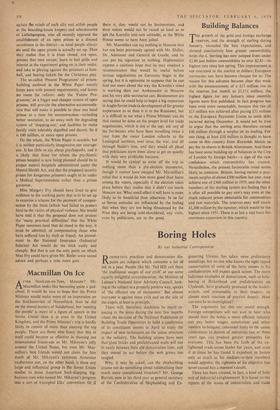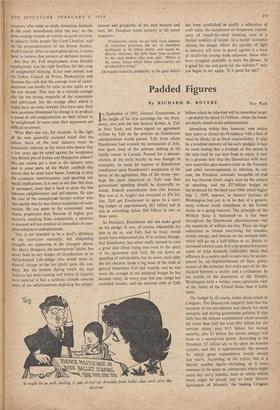Boring Holes
By our Industrial Correspondent RESTRICTIVE practices and demarcation dis- putes are subjects which consume a lot of ink in a year. People like Mr. Ted Hill call them 'the traditional usages of our craft' or use some equally delightful circumlocution; the Minister of Labour's National Joint Advisory Council, look- ing at the subject in a properly positive way, speaks of 'the efficient use of manpower.' But almost everyone is against these evils and on the side of the angels, at least in principle.
There will, therefore, doubtless be much re- joicing in the press during the next few months about the decision of the National Federation of Building Trade Operatives to hold a conference of its constituent unions in April to study the impact of new techniques on the union structure. in the industry. The building unions have seen that 'glass bricks and prefabricated walls will not fit easily between their old demarcation lines, and they intend to act before the web grows too tangled.
Why, it may be asked, can the shipbuilding unions not do something about rationalising their much more complicated structure? Mr. George Barratt, now in his third year as general secretary of the Confederation of Shipbuilding and En- gineering Unions, has taken some preliminary soundings, but no one who knows the tight-lipped conservatism of sonic of the 'forty unions in his confederation will expect quick action. The more ludicrous examples of demarcation, such as hole- boring in Birkenhead and prefabrication on Clydeside, have gradually produced in the leader- 'writers, and presumably in their readers, an almost stock reaction of puzzled despair. How can men be so shortsighted?
The arguments for this are sound enough. Foreign competitors will not wait to hear who should bore the holes; a more efficient industry can pay better wages; automation and other modern techniques, canvassed hotly in the union conferences in dozens of industries two or three years ago, can produce .greater prosperity for everyone. This has been the faith of the en- lightened trade-union leader for years, and even if at times he has found it expedient to hasten only as much as his medium-to-slow members would approve, the rightness of his objective has never caused him a moment's doubt.
There has been created, in fact, a kind of holy writ of industrial enlightenment. It is based on the repOrts of the teams of industrialists and trade unionists who went to study American methods in the years immediately after the war; on the never-ending streams of articles on good relations in industry from people like Lord Chandos; and on the pronouncements of the British Produc- tivity Council. After so much good advice, it seems hard to believe that corners of darkness remain.
But they do. Full employment, even brimful employment, was the right fertiliser for this crop of enlightened thinking. It has now passed, and the Cohen Council on Prices, Productivity and Incomes has said that the average level of unem- ployment can hardly be quite as low again as in the last decade. This may be a suitable enough diet for the strong stomachs of the economists and politicians, but the strange effect which it might have on some workers who have seen their own positions threatened by change is to produce a mood of self-congratulation on their refusal to be enlightened. In some cases their arguments are difficult to answer.
What does one say, for example, in the light of the now generally accepted belief that the labour force of the coal industry must be drastically reduced, to the miner who boasts that a few years ago he voted against the acceptance into British pits of Italian and Hungarian miners? His son cannot get a start in the industry now, and in some parts of the Welsh coalfield this means that he must leave home. Looking at only the economic considerations, and ignoring any social implications, it is easy to see that this man, in retrospect, must find it hard to draw the line between enlightenment and self-interest. Or take the cases of the unemployed factory worker who says darkly that he was always suspicious of auto- mation. He can point to the economists' most recent prophecies that, because of higher pro- ductivity resulting from automation, a recovery in demand will not produce an immediate or com- plete solution to unemployment.
This is not intended to be a devil's advocacy of the restrictive mentality, but disquieting thoughts are appearing in the strangest places. Mr. Harry Douglass, the steelworkers' leader, has never been in any danger of classification as an old-fashioned Left-winger who would resist in- dustrial change to the last ditch; quite the con- trary. But the months during which the steel industry has been running well below its capacity have induced in him a sardonic attitude towards some of the advertisements depicting the enlight- 'lt might be as well, darling, if you picked up Amanda from
election.' ballet class until after the
enment and prosperity of the steel masters and men. Mr. Douglass wrote recently in his union magazine : Productivity arises, we are told, from absence of restrictive practices, the use of expensive machinery to its fullest extent, and sound in- dustrial relations. All these have been accepted by the steel worker, who now asks : 'Where is the secure future 'which these achievements are prophesied to bring?'
Increased material prosperity is the goal which has been established to justify a relaxation of craft rules, the acceptance of temporary redund- ancy, of round-the-clock working, even of a limited mobility of labour. In a harder economic climate the danger which the apostles of light in industry will have to guard against is a bout of recidivism among trade unionists. Some who have struggled painfully to learn the phrase, 'Is it good for me and good for the industry?' may just begin to say again, 'Is it good for me?'







































 Previous page
Previous page